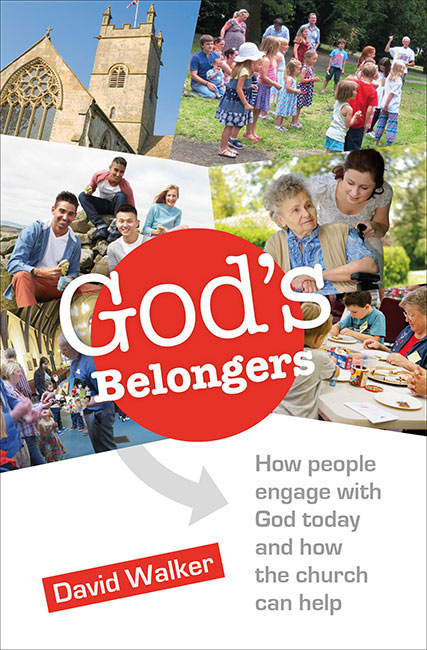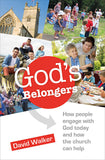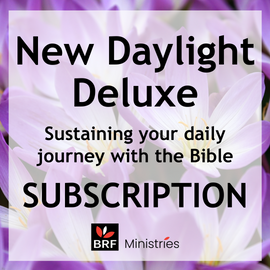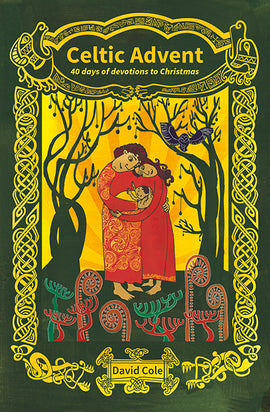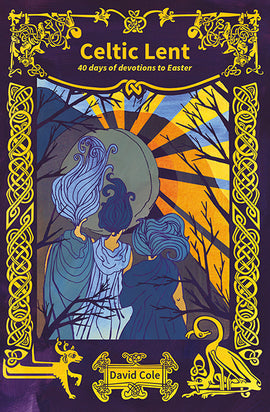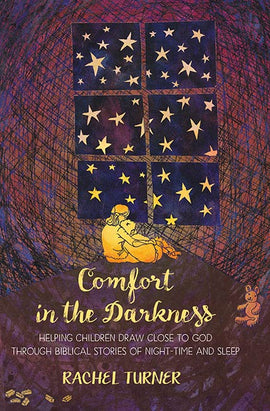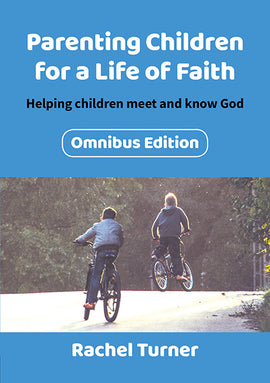God's Belongers: How people engage with God today and how the church can help
This book transforms thinking about church membership by replacing the division between 'members' and 'non-members' with a four-fold model of belonging. Based in extensive practical research, David Walker shows how 'belonging' can encompass a far wider group of people than those who attend weekly services. He examines belonging through relationship, through place and through events, as well as the traditional belonging through activities. He goes on to explore the opportunities for mission that emerge as a result - while also acknowledging the challenges posed for issues such as church financing.
| Title | God's Belongers: How people engage with God today and how the church can help |
| Author | David Walker |
| Description | This book transforms thinking about church membership by replacing the division between 'members' and 'non-members' with a four-fold model of belonging. Based in extensive practical research, David Walker shows how 'belonging' can encompass a far wider group of people than those who attend weekly services. He examines belonging through relationship, through place and through events, as well as the traditional belonging through activities. He goes on to explore the opportunities for mission that emerge as a result - while also acknowledging the challenges posed for issues such as church financing. Contents
Part 1: How we belong
Part 2: Belonging for mission
Part 3: Who else is missing?
ForewordWhenever the church gets to talking about numbers, sooner or later someone will protest that it is not all about bums on seats, is it? Well, yes and no. As this readable and insightful book from David Walker makes clear, belonging cannot simply be measured by your attendance record. There are multiple ways of belonging to any organisation or community, and especially the church. But if instead of 'bums on seats' the church talked about 'hearts being changed' or 'lives being transformed', and once we realise that there can be no impact in our local communities and wider society unless there are at least some people who not only belong, but whose belonging shapes and directs the whole of their lives, i.e. their hearts are being changed and their lives are being transformed, then we begin to see that understanding how people belong and ministering to people in their different ways of belonging is something worth thinking about. This book will help you. |
| Details |
|
This book transforms thinking about church membership by replacing the division between 'members' and 'non-members' with a four-fold model of belonging. Based in extensive practical research, David Walker shows how 'belonging' can encompass a far wider group of people than those who attend weekly services. He examines belonging through relationship, through place and through events, as well as the traditional belonging through activities. He goes on to explore the opportunities for mission that emerge as a result - while also acknowledging the challenges posed for issues such as church financing.
Contents
- Introduction: an aid for mission
Part 1: How we belong
- 1 Belonging: a theological concept
- 2 Reliably regular: belonging through church activities
- 3 People power: belonging through relationships
- 4 Only the once: belonging through events
- 5 Location, location: belonging through place
- 6 The mystery of the missing vicar: an example of belonging
Part 2: Belonging for mission
- 7 What's the difference? Understanding occasional churchgoers
- 8 Together in mission: the Five Marks of Mission
- 9 Paying the piper: what has become of Anglican governance and finance?
Part 3: Who else is missing?
- 10 Types and temperaments: what is Psychological Type?
- 11 Models for motivation: exploring the world of Religious Orientation
- 12 Never on Sunday: the opportunities and challenges of Sunday worship
Foreword
Whenever the church gets to talking about numbers, sooner or later someone will protest that it is not all about bums on seats, is it? Well, yes and no. As this readable and insightful book from David Walker makes clear, belonging cannot simply be measured by your attendance record. There are multiple ways of belonging to any organisation or community, and especially the church. But if instead of 'bums on seats' the church talked about 'hearts being changed' or 'lives being transformed', and once we realise that there can be no impact in our local communities and wider society unless there are at least some people who not only belong, but whose belonging shapes and directs the whole of their lives, i.e. their hearts are being changed and their lives are being transformed, then we begin to see that understanding how people belong and ministering to people in their different ways of belonging is something worth thinking about. This book will help you.
The Rt Revd Stephen Cottrell
 After a Maths degree at Cambridge, David Walker trained in theology in Birmingham. He served in churches in the dioceses of Sheffield before becoming Bishop of Dudley in 2000 and then in 2013 Bishop of Manchester. He is involved in writing a continuing series of papers for peer review journals and the International Society of Empirical Research in Theology, using quantitative methods to analyse aspects of rural Anglicanism. He is a Fellow of the Royal Society of Arts, a member of the Rural Theology Association, the Church of England Ministry Council and one of the Church Commissioners for England. He has contributed chapters to a number of books including Changing Rural Life: A Christian response to key rural issues (Canterbury Press, 2004), Rural Life and Rural Church: theological and empirical perspectives (Equinox, 2012), Exploring Ordinary Theology: everyday Christian believing and the Church (Ashgate, 2013). He has written papers for (amongst other journals) Rural Theology, the Journal of Beliefs & Values and the Journal of Anglican Studies. In 2014 he was awarded a PhD from the University of Warwick for the studies on which this book will be based.
After a Maths degree at Cambridge, David Walker trained in theology in Birmingham. He served in churches in the dioceses of Sheffield before becoming Bishop of Dudley in 2000 and then in 2013 Bishop of Manchester. He is involved in writing a continuing series of papers for peer review journals and the International Society of Empirical Research in Theology, using quantitative methods to analyse aspects of rural Anglicanism. He is a Fellow of the Royal Society of Arts, a member of the Rural Theology Association, the Church of England Ministry Council and one of the Church Commissioners for England. He has contributed chapters to a number of books including Changing Rural Life: A Christian response to key rural issues (Canterbury Press, 2004), Rural Life and Rural Church: theological and empirical perspectives (Equinox, 2012), Exploring Ordinary Theology: everyday Christian believing and the Church (Ashgate, 2013). He has written papers for (amongst other journals) Rural Theology, the Journal of Beliefs & Values and the Journal of Anglican Studies. In 2014 he was awarded a PhD from the University of Warwick for the studies on which this book will be based.
Church Times 21.7.17
Review by Stephen Cottrell, Bishop of Chelmsford of God's Belongers: How people engage with God today and how the Church can help by David Walker and Reproducing Churches by George Lings
Once in a while, a book comes along that changes the way you look at things. Here are two.
David Walker's delightfully titled God's Belongers analyses the different ways in which people express their belonging to church and their engagement with God, and suggests new strategies that will help the local church understand and provide for this belonging.
Based on extensive research of church attendance at rural harvest festivals and Christmas carol services, the central thesis of this book is that regular churchgoing is not the only way in which Christian belonging is expressed.
On one level, this is completely obvious. Most churches, however, persist with a gold standard of 'every-Sunday-morning' belonging, and all evangelistic endeavour is geared towards achieving this. But, as Walker's well-researched and well-argued book unfolds, we find that belonging can be measured in other ways, and this is more to do with personality and circumstance than commitment.
So, the one who comes less often is not necessarily less committed. Someone whose primary belonging comes through relationships, and who wishes to express this in service, may never come every week. But his or her 'lived-out' discipleship, day by day, demonstrates a commitment equal to any weekly communicant. If weekly attendance is the only goal, this person's faith development may be stymied, and the church's ability and flexibility to grow in different ways diminished.
Put this alongside the vastly changed pattern of work, leisure, and family life in Britain today, and the impact on church life is plain to see. Strategies for evangelism and discipleship need to work with the grain of these different types of belonging, not against them.
The development of Fresh Expressions in the Church of England is one such example of helping people to belong differently.
Fresh Expressions of Church is not a stepping-stone towards the so-called 'real church' of Sunday morning. Worshipping in a variety of cultural styles, meeting in different places and different formats and at different times, Fresh Expressions have enabled the Church to broaden its reach.
This has been a remarkable story of missional and ecclesiological enterprise, and, although many people have played a significant part in this story, none has done more than George Lings. His ministry as theologian, researcher and church-planter has provided the impetus and inspiration for the Church to try new things. He has also led the way in enabling the Church to reflect on and learn from these experiments.
All this is brought together in Reproducing Churches. Lings explains and develops the basic thesis that reproduction is inherent in what it means to be the Church, not merely an optional function that some may choose. In other words, for the Church to be the Church it must reproduce. Based, again, on extensive research and vast experience, this book is probably the best available handbook for understanding church-planting and Fresh Expressions, and seeing how the Church can become what it is meant to be be. Put these two books together, and every church will be rethinking its evangelistic strategy.
Review by the Rt Revd Stephen Cottrell, Bishop of Chelmsford
Arthur Rank Centre Resources. Review by Revd Elizabeth Clark, National Rural Officer for the Methodist and United Reformed Churches
In this challenging book David Walker, Bishop of Manchester, argues that people belong to their community and to church in different ways. Some belong through activities and are often regular churchgoers and office holders in the church, the sort of person everyone knows and likes. This person helps others to relate to God.
In 'God's Belongers' these ways of belonging are offered as a framework within which we might consider how to shape and focus the mission of the church beyond 'people like us.' So often mission is based around the things that those already in the church are comfortable with. Walker challenges us to look at how we can do things differently so that other ways of belonging can be welcomed and accommodated, and people can grow in faith.
In short, this book encourages us to look seriously at those not like us so that we can welcome them. It also challenges us to learn from others because 'the evidence we've found of a rich and complex pattern of belonging challenges the often implicit assumption that occasional church goers are 'nominal' Christians'.
While 'God's Belongers' inevitably reflects Bishop David's Anglican perspective, his insights are more widely applicable are easy to translate for other denominational contexts.
Review by Elizabeth Clark, National Rural Officer for the Methodist and United Reformed Churches
The Reader (Spring 2018). Review by Janice Price
This is an important research based examination of how people belong to church. Based on two surveys taken in 2007 and 2009 in the Dioceses of Worcester and Lichfield, Walker outlines four ways - through people, places, one-off events and regular activities - that people belong to the Church. The samples were taken at rural harvest services and Christmas carol services and show information about the attitudes or regular churchgoers to those who attend occasionally. Walker argues that people, places or one-off events are co-workers with regular attendees and not objects of mission. He also asks whether it is possible to be a good Christian and not go to church very often. 'God's Belongers' is full of important questions and issues for PCCs, ministry teams and others to consider. It challenges stereotypes of the 'not-often-there' church attendees and deserves wide and careful consideration.
Review by Janice Price

